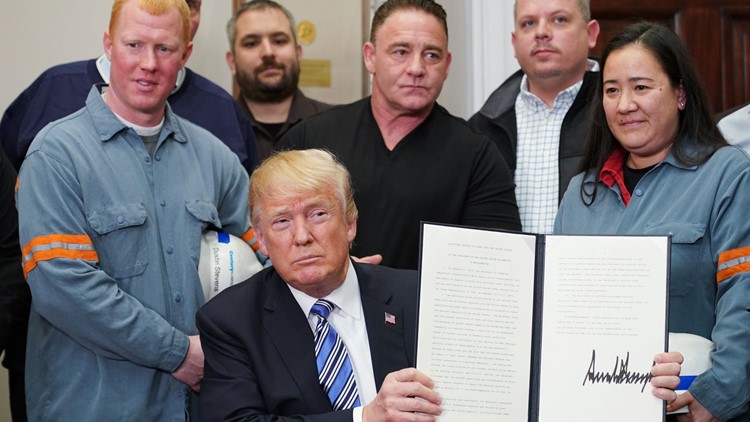Despite warnings by allies that a trade war will increase prices for consumers worldwide, President Trump signed proclamations Thursday imposing tariffs on steel and aluminum imports and said they are designed to protect American industries.
In statements from the White House, Trump said his plan does exempt Canada and Mexico from the tariffs, pending the outcome of ongoing trade negotiations, and allows other countries to apply for relief from the new duties.
"We want our workers to be protected," Trump said during a meeting with steel and aluminum company employees invited to the White House, also claiming the move is part of protecting "national defense."
During a Cabinet meeting earlier in the day, Trump said, "we're going to be very fair, we're going to be very flexible" toward allies.
While Trump said there would be 25% tariffs on steel and 10% on aluminum, "I'll have a right to go up or down, depending on the country. And I'll have a right to drop out countries or add countries. We just want fairness. Because we have not been treated fairly by other countries."
The new tariffs take effect in 15 days, he said.
The European Union and other allies have threatened to retaliate with tariffs of their own on American products, from Florida orange juice to Wisconsin motorcycles to Kentucky bourbon. "It will put thousands of European jobs in jeopardy and it has to be met by firm and proportionate response," said Cecilia Malmström, the EU commissioner for trade.
Some fellow Republicans also objected to Trump's tariffs, predicting a trade war that will increase costs for consumers everywhere.
Outgoing Sen. Jeff Flake, R-Ariz., who vowed to introduce legislation nullify Trump's action, ridiculed the notion of "flexible" tariffs: "What does that mean? One day you wake up and you say, ‘I don’t like Australia?’ ... That’s unbelievable.”
The critics include House Speaker Paul Ryan, R-Wisc., who said that "I'm just not a fan of broad based and across the board tariffs because there are a lot of unintended consequences."
During the Cabinet meeting, Trump said he would flexible with "real friends." In addition to Canada and Mexico, Trump also mentioned Australia — "we have a trade surplus with Australia" — while criticizing Germany for what he considers a lack of defense spending.
"We have some friends and some enemies, where we have been tremendously taken advantage of over the years, on trade, and on military," Trump said.
In addition to threatening to go after American products, other countries ridiculed Trump's claim that the tariffs serve the need of national defense, saying the penalties fall more on allies like Canada than potential adversaries like China.
Trump said Canada and Mexico, the U.S. partners in the North American Free Trade Agreement, could avoid tariffs if they grant concessions during ongoing negotiations to re-work NAFTA, a trade deal the president has long criticized.
"With Mexico and Canada, we're going to be throwing NAFTA into the loop," Trump told his Cabinet, though officials in those countries have denounced the president's plan to link tariffs to the long-term trade deal.
Trump announced his pledge in a surprise move a week ago, telling a group of executives he would impose 25% tariffs on steel imports and 10% on aluminum imports.
The tariff issue created major divisions within the White House itself, and led in part to this week's resignation announcement by top economic adviser Gary Cohn.
During his session with aides, Trump noted that it would be Cohn's last Cabinet meeting. He also joked about his soon-to-be-ex-aide's support of free trade, saying that Cohn “may be a globalist, but I still like him."
"He's going to go out and make another couple of hundred million," Trump said, though he suggested that Cohn may return to the government in some capacity. "I don't know if I can put him in the same position though — he's not quite as strong on those tariffs as we want him to be," Trump said.
Trump also said of Cohn: "In his own way, he's a nationalist, because he loves our country."
A number of Republicans, nominal allies of Trump, have criticized the tariffs.
In a letter released Wednesday, 107 House Republicans led by Ways and Means Chairman Kevin Brady – the Texas Republican Trump has praised often for his management of the tax overhaul last year – urged Trump to “tailor” the tariffs to punish “bad actors who trade unfairly and hurt America” such as China.
Broad tariffs, they said, could have “unintended negative consequences to the U.S. economy and its workers,” especially now that lower corporate tax rates are making American companies more competitive in global markets.
“Adding new taxes in the form of broad tariffs would undermine this remarkable progress,” they wrote.
Sen. Charles Schumer, D-N.Y., minority leader in the Senate, said he sympathizes with Trump's criticism of trade rules, but the main culprit is China. Trump's plan doesn't address the Chinese, he said, because other countries supply more steel and aluminum to the U.S.
"Instead of getting right at China, the president’s across-the-board tariffs will cause more damage to key allies and other domestic industries," Schumer said. He also hit "the haphazard way these tariffs were put together," and that Trump "makes up his mind one day and changes it the next."
Like other business groups, the National Retail Federation called the tariffs "a self-inflicted wound" that will lead to "higher prices for products ranging from canned goods to cars to electronics."
Some economists defended Trump's plan, saying trade has sucked the life out of American manufacturing.
Peter Morici, a business professor at the University of Maryland, tweeted that Trump "is not starting a trade war" because "we are already in one," especially with China.
"The other side has bazookas & we have been using water pistols," Morici said. "China has targeted one U.S. industry after another, thrown millions of Americans out of work. Time to fight back."
Contributing: Herb Jackson



